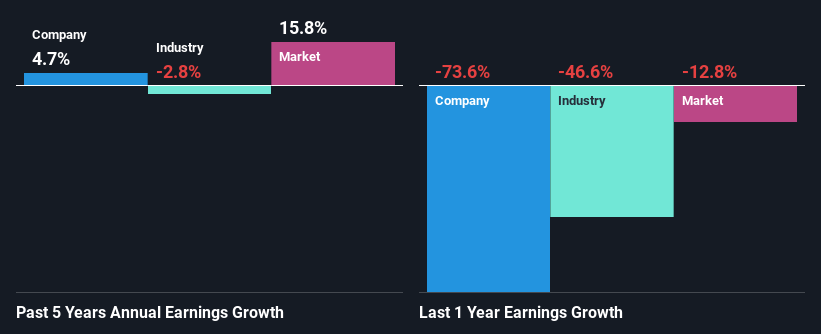Are Samsung Electronics Co., Ltd.'s (KRX:005930) Fundamentals Good Enough to Warrant Buying Given The Stock's Recent Weakness?
Samsung Electronics (KRX:005930) has had a rough month with its share price down 1.1%. However, stock prices are usually driven by a company’s financials over the long term, which in this case look pretty respectable. In this article, we decided to focus on Samsung Electronics' ROE.
Return on equity or ROE is an important factor to be considered by a shareholder because it tells them how effectively their capital is being reinvested. Put another way, it reveals the company's success at turning shareholder investments into profits.
Check out our latest analysis for Samsung Electronics
How To Calculate Return On Equity?
ROE can be calculated by using the formula:
Return on Equity = Net Profit (from continuing operations) ÷ Shareholders' Equity
So, based on the above formula, the ROE for Samsung Electronics is:
4.3% = ₩15t ÷ ₩364t (Based on the trailing twelve months to December 2023).
The 'return' is the income the business earned over the last year. That means that for every ₩1 worth of shareholders' equity, the company generated ₩0.04 in profit.
What Is The Relationship Between ROE And Earnings Growth?
Thus far, we have learned that ROE measures how efficiently a company is generating its profits. Based on how much of its profits the company chooses to reinvest or "retain", we are then able to evaluate a company's future ability to generate profits. Assuming everything else remains unchanged, the higher the ROE and profit retention, the higher the growth rate of a company compared to companies that don't necessarily bear these characteristics.
Samsung Electronics' Earnings Growth And 4.3% ROE
It is hard to argue that Samsung Electronics' ROE is much good in and of itself. A comparison with the industry shows that the company's ROE is pretty similar to the average industry ROE of 4.5%. Thus, the low ROE certainly provides some context to Samsung Electronics' very little net income growth of 4.7% seen over the past five years.
Next, on comparing with the industry net income growth, we found that the growth figure reported by Samsung Electronics compares quite favourably to the industry average, which shows a decline of 2.8% over the last few years.

Earnings growth is an important metric to consider when valuing a stock. What investors need to determine next is if the expected earnings growth, or the lack of it, is already built into the share price. This then helps them determine if the stock is placed for a bright or bleak future. What is A005930 worth today? The intrinsic value infographic in our free research report helps visualize whether A005930 is currently mispriced by the market.
Is Samsung Electronics Making Efficient Use Of Its Profits?
Despite having a normal three-year median payout ratio of 28% (or a retention ratio of 72% over the past three years, Samsung Electronics has seen very little growth in earnings as we saw above. So there could be some other explanation in that regard. For instance, the company's business may be deteriorating.
In addition, Samsung Electronics has been paying dividends over a period of at least ten years suggesting that keeping up dividend payments is way more important to the management even if it comes at the cost of business growth. Based on the latest analysts' estimates, we found that the company's future payout ratio over the next three years is expected to hold steady at 26%. Regardless, the future ROE for Samsung Electronics is predicted to rise to 11% despite there being not much change expected in its payout ratio.
Summary
On the whole, we do feel that Samsung Electronics has some positive attributes. Even in spite of the low rate of return, the company has posted impressive earnings growth as a result of reinvesting heavily into its business. Having said that, looking at the current analyst estimates, we found that the company's earnings are expected to gain momentum. To know more about the company's future earnings growth forecasts take a look at this free report on analyst forecasts for the company to find out more.
Have feedback on this article? Concerned about the content? Get in touch with us directly. Alternatively, email editorial-team (at) simplywallst.com.
This article by Simply Wall St is general in nature. We provide commentary based on historical data and analyst forecasts only using an unbiased methodology and our articles are not intended to be financial advice. It does not constitute a recommendation to buy or sell any stock, and does not take account of your objectives, or your financial situation. We aim to bring you long-term focused analysis driven by fundamental data. Note that our analysis may not factor in the latest price-sensitive company announcements or qualitative material. Simply Wall St has no position in any stocks mentioned.
 Index Options
Index Options CME Group
CME Group Nasdaq
Nasdaq Cboe
Cboe TradingView
TradingView Wall Street Journal
Wall Street Journal